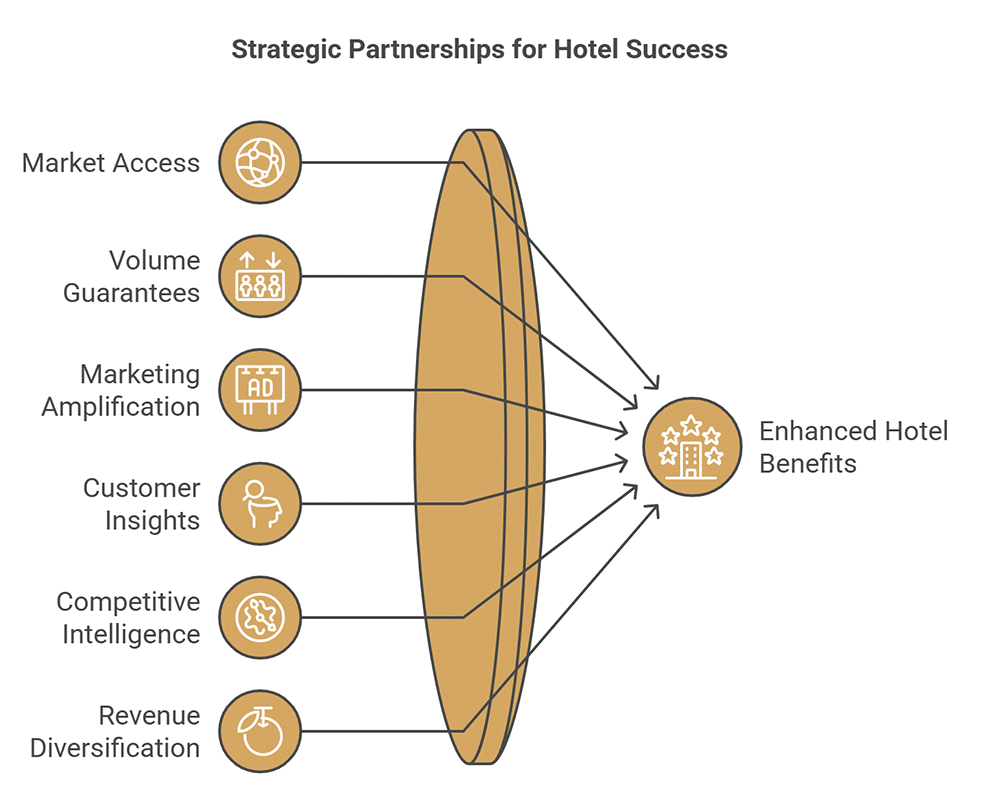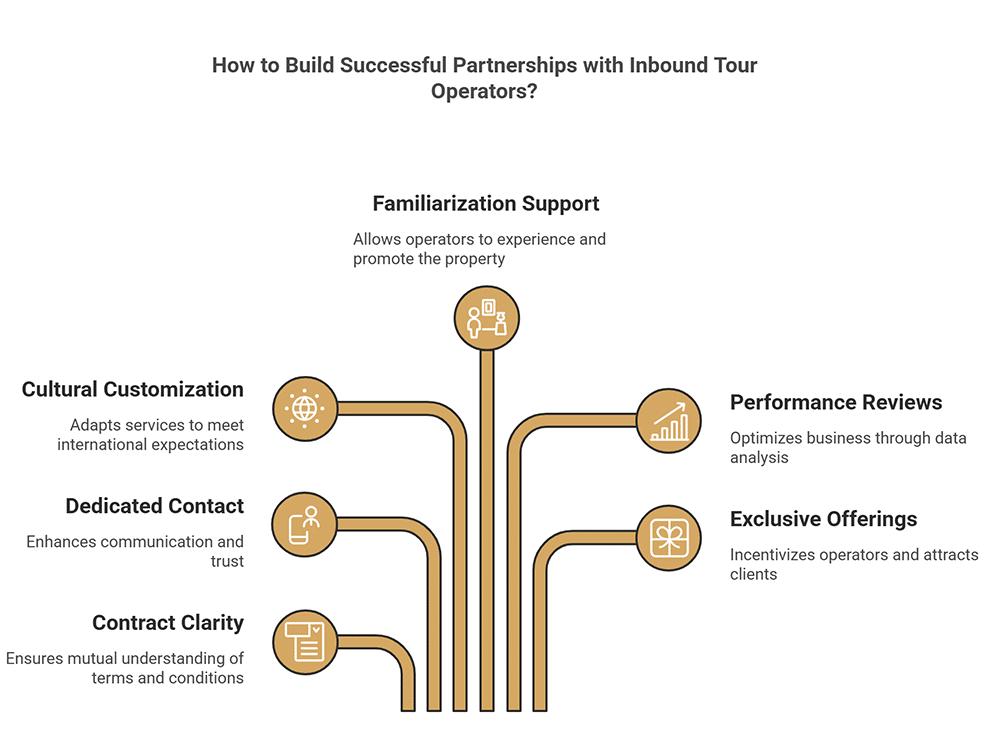Inbound tour operators are key players in the international travel and hospitality industry. Tourists use these services to make sure their international trips live up to their dreams. Meanwhile, the hospitality sector ensures the same by working with inbound tour operators, expanding their base into the international sector at the same time.
In this article, you’ll learn how inbound tour operators function, why they’re important, and how to partner with them to form a mutually beneficial business endeavor.
Table of Contents:
- What is an Inbound Tour Operator?
- Why Inbound Tour Operators are Important for Hotels?
- How Inbound Tour Operators Work?
- Inbound vs. Outbound Tour Operators
- How Hoteliers Can Benefit from Partnering with Inbound Tour Operators
- Leading Inbound Tour Operators Worldwide
- Strategies to Build Successful Partnerships with Inbound Tour Operators
- Tour Operators Hoteliers Should Partner With
- Tourism Trends: The Latest Opportunities for The Tourism Industry
What is an Inbound Tour Operator?
Inbound tour operators are a highly optimized part of the travel business that helps inbound travelers from abroad discover new adventures in the operator’s area. The operation is known under several different labels, such as a receptive tour operator. However, the operator’s purpose and methods of operation are generally consistent no matter their label. They’re experts in a particular location who can help travelers, typically from other countries, get the full local experience. This is generally furthered by partnerships with local hotels and attractions.
The operator serves as a bridge and translator between distant travelers and their destination. They might create tour itineraries, negotiate rates for various services, provide multilingual guides who can translate words and customs alike, navigation assistance, and more. The service covers everything from the first flight to the last dinner before returning home.
Video: What is an Inbound Tour Operator
Why Inbound Tour Operators Are Important for Hotels?
Inbound tour operators can function as an immensely beneficial marketing asset. The operators essentially serve as a remote relay to market your services to overseas markets. The tour operators even carry the brunt of the financial costs of doing so and translate your brand messaging over linguistic and cultural divides. The practice increases a hotel’s business, even during periods that would otherwise exist within a seasonal slump. Hotels also benefit from the operators’ existing business connections and distribution networks. Finally, the operators provide pre-vetted guests who will be an ideal fit for your services.
How Inbound Tour Operators Work?
Inbound tour operators start the process with local suppliers. These contracts are typically extended to hotels, community attractions, transportation services, restaurants, and similar local features. The agreements are generally service-level and include net rates. The tour operator or destination management company (DMC) will then craft specialized travel packages.
Packages combine everything from transportation to accommodations and entertainment into an appealing whole. The inbound and outbound sides of the travel industry will often work together to sell these collections on a global level. This process creates a powerful B2B system that powers easily scaled international bookings.
The inbound operator handles almost all of the transactional elements, from the traveler getting off the plane and into local transportation to guided tours. Even security will typically be included in an operator’s package. Online tools and CRM often optimize and distribute data to partners to further streamline the process. For more information about hotels CRM system, read “Hotel CRM System: The Ultimate Guide to Customer Relationship Management.”
Inbound vs. Outbound Tour Operators
Outbound tour operators are the flip side of inbound tour operators. Inbound operators are generally locals who help people who are inbound to that destination. Outbound operators generally function around the area from which the traveler is leaving.
Both the inbound and outbound sides of the tourism industry deal with longer, typically foreign, travel. Additional elements like service as a local ground handler are often seen in both as well. However, the differences between the two operators are significant enough to make them quite distinct. These are the key points that differentiate these two services from each other:
- Demographics: Outbound operators help locals with international travel, while inbound operators help international travelers visit their covered areas.
- Insight: Inbound operators are experts in specific local areas, while outbound operators try to maintain a larger scale expertise for both source and destination.
- Business Networking: Outbound operators usually partner internationally, such as with foreign hotels, while inbound operators contract with local hotels and services.
- Source and Destination: This is the most significant point. Inbound operators receive visiting travelers, while outbound operators help locals leave and travel abroad.
How Hoteliers Can Benefit from Partnering with Inbound Tour Operators
Hotels working with inbound tour operators stand to reap some significant benefits. The following are some of the most important things to consider:
- Market Access: Inbound tour operators work through the international market and can connect you with various links in that chain to expand your reach overseas.
- Volume Guarantees: An incoming tour operator will often work with guaranteed minimums for room blocks that can help ensure both proper occupancy forecasts for a hotel and make up for seasonal slumps.
- Marketing Amplification: Working with inbound tour operators provides a boost to marketing by extending international visibility with trade events, website presence, print media like brochures, and more, without additional cost. If you want to learn more about tourism marketing, read “Tourism Marketing: Brand New Marketing Tips to Boost Your Results.”
- Customer Insights: You can gain tremendous insight into the expectations, preferences, and overall satisfaction of international guests by working with inbound tour operators
- Competitive Intelligence: An inbound travel agency works with different people, tour companies, and properties and can act as an informational hub to keep you in the loop with new opportunities.
- Revenue Diversification: You can diversify client and market presence through the use of multiple inbound tour operators while also minimizing dependency on any single element.
Leading Inbound Tour Operators Worldwide
The rapidity of changes within the consumer landscape makes innovation and growth an important element of inbound tour operators. The following examples exemplify how operators can grow alongside those new travel trends and expectations.
1. G Adventures
Responsible but still adventurous, international travel is an enticing prospect, and G Adventures has it covered. These inbound tour operators run from over 100 countries through tours tailored to the locals and local suppliers. This local touch ensures that the operators are able to provide their clients with true authenticity. Hotels benefit not only from increased bookings but also from G Adventures’ frequent travel schedules and a strong appreciation for unique destinations. It’s a fantastic example of a fun but sustainable travel experience.
Video: G Adventures Review
2. Intrepid Travel
Intrepid Travel is especially notable for its emphasis on exciting but sustainable tours. It’s one of the largest B-Corp travel companies and is continually expanding with new acquisitions such as Sawadee Reizen. This tour operator can act as a destination service provider by focusing on more intimate experiences for smaller groups of travelers. Some examples include Intrepid Travel’s focus on community engagement through cultural activities and eco-conscious living during the stay. Hotels will also appreciate Intrepid Travel’s work on long-term partnerships with entities that share their values.
Video: This is the New Intrepid
3. Explore Worldwide
Explore Worldwide is an inbound tour operator that brings small groups of environmentally aware travelers together to go on amazing adventures through over 120 countries via 500 itineraries. It puts special emphasis on immersion in the local environment through wildlife experiences, walking, and cycling over driving. These experiences ensure that travelers can truly feel what it’s like to live within these new environments. Explore Worldwide also puts special emphasis on local flavor with boutique-style hospitality, local guides, and accommodations. It’s a solid match for adventure-focused, eco-aware hotels.
Video: Travel Responsibly with Explore Worldwide
4. Exodus Travels
Exodus Travels provides smaller groups of travelers with responsible, guided trips. For over 45 years, Exodus Travels has been providing in-depth experiences to eager travelers ready to explore Asia, Europe, America, and Africa. Some of the most notable experiences include hiking, cycling, wildlife tours, and exploration of the local culture. All of these services come with a special emphasis on sustainability. Hotels with a similar mindset benefit from the inbound tour operators’ dedication to local immersion and activity.
Video: Exodus Adventure Travels & Quark Expeditions: Leading Partners in Adventure Travel
5. Globus
Globus operates in over 70 countries with a support network of transportation, local guides, and hotels. These inbound tour operators provide a curated experience that includes higher-quality accommodations and logistics with a focus on efficient comfort. This makes them an ideal match for hotels that want to consistently manage their volume with a diverse range of guests.
Video: Fewer People. More Wow! | Globus Escapes Tours
6. Trafalgar
Trafalgar is well known for its popular “Be My Guest” experience. These inbound tour operators are part of the larger The Travel Corporation and are among the global leaders in curated group tours. Trafalgar creates seamless connections between travelers and local services like cultural venues, hotels, and transportation options in order to ensure comfort and immersion. Hotels partnered with Trafalgar will benefit from their emphasis on reliable consistency that produces a steady stream of guests.
7. Collette
Collette is a family-owned business that has offered tours on every continent for over a century. While their range is large, their focus is always on cultural immersion. Guests will have the chance to fully experience the local culture and climate while going on everything from walking tours to river cruises. Hotels in North America and Europe, in particular, will benefit from the reputation and existing relationships provided by these inbound tour operators. This translates into consistent group business for hotels.
Video: Small Group Explorations | Collette
8. Contiki
Contiki is a unique option among inbound tour operators thanks to its focus on social experiences. This operator’s adventures are specially honed to match the expectations of 18 to 35-year-olds with an interest in both adventure and nightlife. The service is heavy on social interaction and sights that are a perfect fit for Instagram and other social media. This makes Contiki an excellent partner for hospitality services with a focus on visual appeal, such as boutique hotels. Likewise, Contiki is especially notable for hotels aiming at the millennial or Gen Z market.
Video: What Does it Take to Become a Contiki Trip Manager?
9. Perla Tours
Perla Tours is a Barcelona-based agency that specializes in Mediterranean destinations. These inbound tour operators are experts in Spain’s unique cultural treasures. Guests will be immersed in Spain’s nature, culinary experiences, and architectural wonders. The goal is always authenticity, and hotel partnerships further enhance that element. All of these factors make Perla Tours an excellent option for hotels seeking to cultivate reliable, high-value, international guests.
Video: Perla Tours – Incoming Partner
10. Bonotel Exclusive Travel
Bonotel Exclusive Travel is one of the leaders in boutique and luxury options among inbound tour operators in North America. Their curated hotel list links over 2,600 travel agencies to form a powerful distribution network. Bonotel Exclusive Travel is especially notable for hoteliers interested in growing their international market. A focus on luxury options translates to stronger booking value, while centralized platforms make it even easier to make reservations.
11. Travel Addicts Limited
Travel Addicts Limited is a New Zealand-based organization that offers custom experiences for travelers going alone or in a group. These inbound tour operators open up the country’s renowned natural beauty and cultural attractions to guests from all over the world. They’ve grown alongside increased interest in New Zealand tourism to provide fun, educational, and sustainable exploration. A variety of lodgings benefit from partnerships, ranging from boutique inns to eco-lodges.
12. Eurotours
Eurotours is among the top inbound tour operators in Australia, serving over a million travelers every year. It works with hotels in Germany, Austria, Switzerland, and more to open up new experiences for group travel. The emphasis on groups means that hotels benefit from larger volumes even after accounting for seasonal variance. Hotels in the DACH region should consider Eurotours to be of particular importance, thanks to elements like a high value-for-money ratio and links to local suppliers.
13. Neo Travel
Neo Travel provides options that range from personalized tours to cultural packages and group experiences. The inbound tour operators support Portugal, Spain, Andorra, Mexico, the Dominican Republic, and Cuba. The agency customizes packages and itineraries to seamlessly blend with the local culture. The immersion is further aided by a bilingual support team ready to work with hospitality partners. This level of close collaboration makes them an ideal partner for hotels in Latin America, Iberia, and the Spanish-speaking world in general.
Video: How Can Independent Hotels Maximise Exposure on OTAs?
Strategies to Build Successful Partnerships with Inbound Tour Operators
Working with a local inbound operator will ideally benefit both parties. If you follow these best practice procedures, you’ll ensure a mutually rewarding partnership.
- Contract Clarity: Create firm, understandable definitions for booking conditions, rates, commissions, and cancellation policies with the inbound tour operators.
- Dedicated Contact Person: Choose one member of your staff to act as a contact point for the local tour operator to build trust, strengthen communication channels, optimize problem-solving, and make it a more personalized experience
- Cultural Customization: The inbound tour operators are cultural experts who can help you adapt dining, amenities, and other guest-focused services to the specific expectations shaped by different segments of the international stage.
- Familiarization Support: Bring the inbound tour operators in on a regular basis for complimentary stays where they can inspect the property as both parties discuss how to present the experience to future clients.
- Performance Reviews: Work with your receptive travel company on a regular schedule, such as quarterly meetings, to optimize business and find potential growth opportunities through data analysis, including guest feedback, booking metrics, and trends within the larger market.
- Exclusive Offerings: Collaborate with inbound tour operators to create exclusive packages that they can offer to elevate their services in the eyes of potential international clients, incentivizing the tour operators at the same time.
Tour Operators Hoteliers Should Partner With
Inbound tour operators are an important asset to the hospitality industry. However, there are a variety of tour operators, and each one brings unique benefits. Every business that creates a new travel experience offers unique chances to expand your market. Likewise, they handle many of the different elements of travel, like negotiations or general logistics, to streamline the guest’s stay. You’ll learn all about the various options and the different types of tour operators in the article “Tour Operators Hoteliers Should Partner With.”
Tourism Trends: The Latest Opportunities for The Tourism Industry
Individual attention is a recurrent element in any discussion of inbound tour operators. It’s one part of a larger trend where travelers want a more personal experience. This is further driven by trends in environmental awareness, new technologies, and cultural appreciation. Industry-wide changes pose difficulties for the hospitality industry, but also give you the chance to connect with travelers in a more meaningful way. You can find a broad overview of these new influences and how to work them into your own business in the article “Tourism Trends“.
Inbound tour operators aren’t just a boon to international travelers; and they’re a powerful tool for the hospitality industry. However, getting the most out of them means studying exactly what they’re capable of and how to work as an effective partner within their operation.
Did You Like This Article about Inbound Tour Operators?
You might also be interested in the following articles:
- How Artificial Intelligence is Changing the Travel Industry
- 14 Travel Companies That Help Hotels Increase Revenue
- 10 Travel Agents for Hotels to Gain More Corporate & Leisure Guests
More Tips to Grow Your Business
Revfine.com is the leading knowledge platform for the hospitality and travel industry. Professionals use our insights, strategies, and actionable tips to get inspired, optimize revenue, innovate processes, and improve customer experience.Explore expert advice on management, marketing, revenue management, operations, software, and technology in our dedicated Hotel, Hospitality, and Travel & Tourism categories.










Leave A Comment